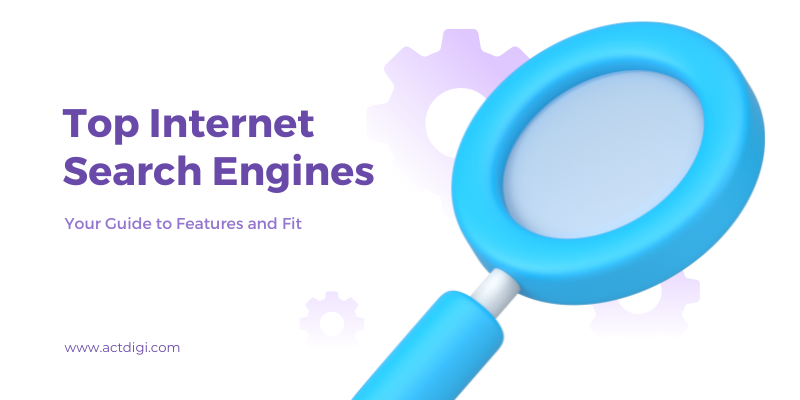Ever wonder how you’d find anything online without a search engine? These tools are like your personal internet compass, guiding you through billions of websites to the exact recipe, article, or product you need. In 2025, search engines are evolving—some prioritize lightning-fast results, others focus on keeping your data private, and a few even help save the planet. With so many choices, how do you pick the right one? I’ve rounded up the top search engines this year, digging into what makes each special, where they stumble, and who they’re best for. Ready to find your perfect match? Let’s get started.
Table of Contents
- Why Search Engines Are a Big Deal
- How We Picked These Search Engines
- The Best Search Engines of 2025
- Quick Comparison Chart
- What’s Next for Search Engines
- Tips for Choosing Your Search Engine
- Wrapping Up
Why Search Engines Are a Big Deal
Imagine the internet as a massive library with no catalog—chaotic, right? Search engines are the librarians who make sense of it all. They scan and sort billions of web pages, then serve up the most relevant ones when you type in a question or keyword. It’s not just about finding stuff—they’re the backbone of how we learn, shop, and connect online.
In 2025, search engines are doing more than ever. They power voice assistants, fuel business ads, and even shape what we see first. But with growing concerns about privacy and AI changing the game, picking the right one matters. Whether you’re a student researching a paper or a marketer boosting a brand, a good search engine saves time and opens doors.
How We Picked These Search Engines
We didn’t just throw darts at a list of names to build this roundup. Here’s what guided my choices:
- Popularity: How many people use it daily, based on reports like StatCounter’s 2025 data.
- Ease of Use: Is it fast, intuitive, and clear?
- Standout Features: Things like privacy protection, AI smarts, or unique tools.
- 2025 Relevance: Do they fit today’s needs, like voice searches or eco-friendly missions?
I leaned on trusted sources—think Search Engine Journal and industry blogs—to double-check my facts. My goal was to spotlight engines that work for everyone, from tech geeks to folks who just want quick answers. No hype, just real insights.
The Best Search Engines of 2025
Here’s my take on the top players this year, with the good, the not-so-great, and who’ll love them most.
1. Google
What’s It Like? Google’s the best search engine you already know, handling over 90% of searches worldwide in 2025 (StatCounter). It’s practically a verb—“just Google it.”
Cool Features:
- AI answers through Gemini, chatting like a friend who knows everything.
- Ties into Maps, Lens, and Docs for a one-stop shop.
- Killer ad tools for businesses.
Why It’s Great: - Finds what you need in a blink, no matter how obscure.
- Works like a charm on Android or Chrome.
- Packs extras like instant translations or weather updates.
Downsides: - Tracks a lot of your data, which can feel invasive.
- Ads sometimes hog the top of the page.
Perfect For: Anyone who wants fast answers, plus marketers and small businesses leaning on SEO.
2. Bing
What’s It Like? Bing, Microsoft’s underdog, grabs about 3% of searches. It’s got a knack for visuals and a fresh feel.
Cool Features:
- Copilot AI turns searches into conversations.
- Gorgeous daily homepage photos you’ll want to stare at.
- Plugs right into Microsoft 365 and Edge.
Why It’s Great: - Less ad clutter than Google.
- Earns you points for searching (free gift cards, anyone?).
- Rocks for finding images or videos.
Downsides: - Doesn’t always catch the super-specific stuff Google nails.
- Not as big on phones.
Perfect For: Folks tied to Microsoft apps or anyone who loves a clean look.
3. DuckDuckGo
What’s It Like? DuckDuckGo’s all about privacy, quietly growing as the go-to for folks who don’t want to be tracked.
Cool Features:
- No creepy data collection—your searches stay yours.
- “Bangs” (like !w for Wikipedia) zip you to other sites fast.
- Simple design that’s easy on the eyes.
Why It’s Great: - Keeps your info private, no questions asked.
- Still delivers solid results for most searches.
- No targeted ads following you around.
Downsides: - Misses some bells and whistles bigger engines have.
- Smaller pool of indexed sites, so niche topics can be tricky.
Perfect For: Anyone who values privacy or wants a no-fuss experience.
4. Ecosia
What’s It Like? Ecosia’s the green searcher, turning ad money into trees planted worldwide. It’s small but mighty for eco-fans.
Cool Features:
- Runs on Bing’s engine, so results are reliable.
- Shows how many trees you’ve helped plant (over 200 million by 2025!).
- Uses clean energy to power its servers.
Why It’s Great: - Searching feels like a mini good deed.
- Decent for everyday questions or shopping.
- Less tracking than most big names.
Downsides: - Not packed with unique tools.
- Leans on Bing, so it’s not totally its own thing.
Perfect For: People who care about the planet and want their clicks to count.
5. Yandex
What’s It Like? Yandex rules in Russia and nearby countries, offering a tailored experience for local users.
Cool Features:
- AI that’s ace at regional languages, especially Russian.
- Extras like Maps, Music, and Translate for a full toolkit.
- Handles Cyrillic searches like a pro.
Why It’s Great: - Spot-on for non-English searches in its region.
- Feels like a mini-internet for local needs.
- Good ad options for businesses there.
Downsides: - Not a global player—less useful elsewhere.
- Privacy rules aren’t as clear as others.
Perfect For: Travelers or locals in Russia and Eastern Europe needing regional results.
6. Brave Search
What’s It Like? Brave Search, tied to the privacy-first Brave browser, is picking up steam with its independent approach.
Cool Features:
- No tracking, plus its own index for fresh results.
- “Answer” AI gives quick, clear summaries.
- Choose ads for rewards or skip them entirely.
Why It’s Great: - Privacy without skimping on quality.
- Clean layout that’s easy to navigate.
- Growing fast, less tied to the big dogs.
Downsides: - Still catching up to veterans like Google.
- Fewer tie-ins with other apps or services.
Perfect For: Tech fans and privacy buffs looking for something new.
Quick Comparison Chart
| Search Engine | Market Share | Privacy Focus | AI Features | Best Use Case |
| ~90% | Low | Gemini | General, SEO | |
| Bing | ~3% | Moderate | Copilot | Microsoft fans |
| DuckDuckGo | ~1% | High | None | Privacy lovers |
| Ecosia | <1% | Moderate | None | Eco warriors |
| Yandex | ~1% (global) | Low | Regional AI | Local searches |
| Brave Search | <1% | High | Answer AI | Tech + privacy |
What’s Next for Search Engines
Search engines aren’t standing still in 2025, and it’s fun to peek at where they’re headed:
- AI’s Taking Over: Tools like Gemini and Copilot answer questions so fast, you barely need to click links anymore.
- Voice Searches Boom: Thanks to smart speakers, over 40% of searches in some places are spoken, not typed.
- Privacy Matters More: With folks skeptical of Big Tech, engines like DuckDuckGo are winning hearts by keeping data safe.
- Instant Answers Rule: Those boxes at the top of results (snippets, panels) keep you on the search page, shaking up how sites get traffic.
- Doing Good: Ecosia’s tree-planting model is inspiring others to tie searches to causes like sustainability.
These changes show what users care about: getting answers quick, staying private, and maybe even making a difference. Whether you’re just browsing or building a brand, these trends are worth watching.
Tips for Choosing Alternate Search Engines
Not sure which engine’s your vibe? Here’s how to decide:
- Want it all, fast? Google’s your best bet for deep, speedy results.
- Hate being tracked? DuckDuckGo or Brave Search has your back.
- Love the planet? Ecosia makes every search a step toward green.
- Need local flair? Yandex is tops for regional stuff.
- Crave simplicity? Bing or Brave keeps things smooth and sleek.
Try a mix—Google for work, DuckDuckGo for personal stuff, Ecosia when you’re chilling. Play around and see what feels right.
Wrapping Up
Search engines in 2025 are as varied as the people using them. Google’s still the champ for most, but Bing’s visuals, DuckDuckGo’s privacy, Ecosia’s mission, Yandex’s local edge, and Brave’s fresh take give you plenty of options. Whatever you’re after—speed, ethics, or no snooping—there’s something here for you. Give a few a spin and drop a comment with your favorite! Curious how to make these engines work harder for you? Stay tuned for my next post on SEO tricks.

